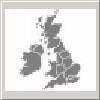Please note that the NBN Gateway map service has been terminated as of 1 April 2017.
As soon as a replacement map service is available, distribution maps will hopefully appear here again.
In the meantime, you can get some idea of distribution from the NBN Atlas website.
63.006 BF1361
Pyrausta aurata
(Scopoli, 1763)
Wingspan 18-20 mm.
This species is often confused with Pyrausta purpuralis. Both can be bright purple with golden markings, especially when fresh, or brown with yellowish markings, especially when worn. The principal distinguishing feature is the arrangement of the postmedian markings on the forewing.
On P. aurata the only consistent postmedian mark is a round golden blotch near the costa, but there is usually a small golden mark between it and the costa. In fresh specimens, there is sometimes a thin indistinct wavy golden postmedian line between the round blotch and the dorsum.
On P. purpuralis the postmedian markings can form a continuous broad band, but it is usually broken into three substantial marks. The mark near the dorsum is always much more substantial than that, if any, on P. aurata, and turns towards the base of the wing as it approaches the dorsal edge.
P. aurata has two generations; in May and June, and again through July and August. It flies both during the day and at night.
The larvae feed on mints, including spearmint (Mentha spicata) and Apple mint (Mentha rotundifolia), marjoram (Origanum vulgare), Meadow-clary (Salvia pratensis), Lemon balm (Melissa officinalis), catmint (Nepeta cataria) and calamints (Calamintha spp).
P. aurata is locally common in England, Wales and southern Scotland, both larvae and adults occurring in gardens as well as wild habitats with the foodplants.

 UKMoths
UKMoths 












